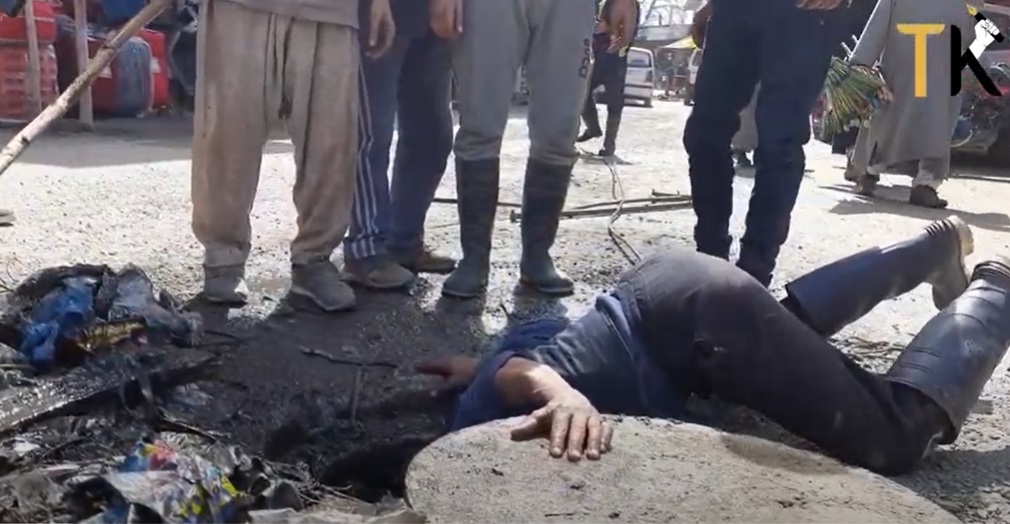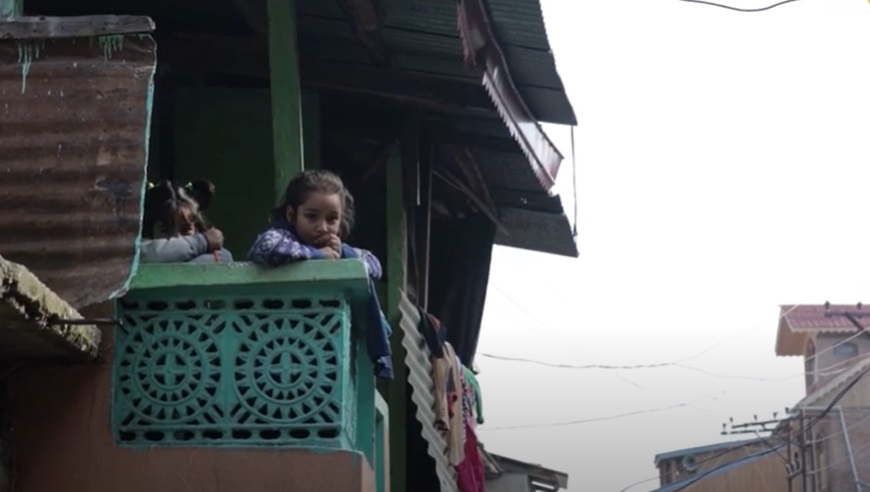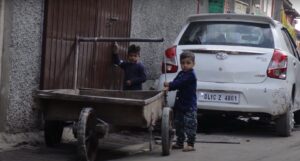
Insha Mushtaq Dar
Shabir Ahmed Sheikh is made to wait for the other guests to finish lunch at a Walima (Wedding Lunch) in the Anantnag district. After several hours having passed, it’s Shabir’s turn to finally relish Wazwan. But by then, Shabir is blue. Someone at the wedding said, “Iman Diyiw Patih saal, praren Taam” (Make them wait, they will have food separately). He despises the fact that he cannot have lunch with other guests. This is not the first time though that he has been made to wait. “We have seen this since our childhood,” Shabir , who is a sweeper in Anantnag district, laments.
The conflict in the disputed region of Jammu Kashmir has always been the ‘centre of attention’ but in between this, several other important issues which continue to obstacle the social and economic progress have been neglected.
One such social issue in the region which has been very less talked about is ‘Caste Discrimination.’ Even though, Kashmiris (Muslims) refute the existence of the caste segregation in the region but the reality is often disappointing. Caste segregation remains prevalent in the region of Kashmir.
Caste in Kashmiri language is known as ‘Kram’ or ‘Zaat’. A person is considered to be a member of the caste into which he or she is born and remains within that caste until death. These castes define the professions a person can work in as well as aspects of their social lives, including whom they can marry. Each ‘Zaat’ is typically associated with a traditional job function, and some are defined by religious variation. The aspects of social lives depend on the ‘Status of the caste’ in the society.
Caste segregation has been there in Kashmir from past centuries. It dates back to the ancient Kashmir, period of Kashmiri Hindus – where the concept of four castes – the Brahmins, the Kshatriyas, the Vaishyas and the Shudras existed.
As per the caste hierarchy of Kashmiri Hindus, the Brahmins were at the top of the hierarchy who were mainly priests, teachers and intellectuals, followed by the Ksyatriyas, who were rulers and warriors. The third caste was the Vaishyas, who were merchants and traders, and the fourth caste were the Shudras, who were labourers and artisans, who did all the menial jobs.
Ancient Kashmir mainly comprised the population of Hindus, Buddhists and Jains. During the fourteenth century, there was influx of Muslim divines and philosophers from Persia and Central Asia in Kashmir who bought with them Islam into the Valley. Gradually, all Hindu castes except for some Brahmins converted to the religion of Islam. Many of those who converted to the religion of Islam, however retained their old surnames. Kauls, Bhats, Mantus, Pandits, Aitus and Rainas were converted from the Brahmin caste. Rathores, Magreys, Thakores, Dars, Nayaks, Lones, Chaks were converted from the Kshatriyas.
The caste hierarchy is not limited to Kashmiri Hindus only, even though very less talked about there is a look alike caste hierarchy among Kashmiri Muslims as well which is faced by Fayaz and thousands like him in the Muslim-dominated region.

The Caste Order in Kashmir
In his book, ‘Directory of Caste in Kashmir’ late Bashir Ahmed Dabla, a renowned Kashmiri sociologist and former head of Kashmir University’s sociology department has defined the caste segregation among Kashmiri Muslims. Over the years, Kashmiri scholars have shed light on the caste privilege and Inter-caste marriage amongst Syeds and Peers. However, nobody speaks about the marital and the social discrimination the Watals undergo in our society every day.
The marriage between upper castes and watals is impractical in the region. The caste hierarchy condemns the Waatals at the bottom of the heap and hence marriage with them is unimaginable for the upper castes. There have been frequent cases of failed relationships among young people which were called off because of the family pressure over caste difference. In many cases, the person from upper caste who chose to marry a lower caste love interest were disowned by the family members.
Maintaining anonymity, many in Srinagar and other areas of Kashmir told The Kashmiriyat that their young men are mostly married to Rohingya and non-Local girls as finding a bride for these “outcaste” men is almost impossible.
“Must be around seven to eight girls from Rohingya ethnicity and at least four non-Locals (Biharis),” Ghulam Hassan Sheikh, a resident of Makhdoom Sahab area in Srinagar said.
Hassan believes that the caste system in Kashmir has always existed in Kashmir, but it has been overshadowed by other issues. Though people embraced Islam, but the people of Kashmir could not do away with the caste system, Hassan says.
Bashir Ahmed Dabla has categorised the Kashmiri Muslim castes into three groups. At the top of this caste hierarchy is the Syed caste, which includes surnames like Geelani, Jeelani, Andrabi, Qadri, Hamdani, Bukhari, Shah, and others. Syed’s consider themselves superior class as they claim to be descendants of the family of Prophet Muhammad (PBUH). Also, it is believed that it was Syeds who bought Islam into Kashmir in the fourteenth century.
After Syeds, the ‘occupational castes’ follows which includes surnames like Wani, Zargar, Bhat, Naqash, Lone, Khandey, Ahangar, etc. This caste denotes the occupation that the ancestors of the people with these castes had taken up.
At the bottom of this hierarchy are the ‘service castes’ which include surnames like Hanjis, Waza, Gilkar, Sofi, Dobi, Ganie, Bangi, or Sheikh. This category has been referred as caste of menials. Many of them fall under OBC (Other Backward Classes) definition of the Constitution of India or Pasmanda Muslims (refers to Muslims belonging to the lower castes). These are generally people without any land. These people are treated with disdain and are subjected to ostracisation.
The most intriguing caste in this hierarchy is the ‘Sheikh’ caste. If ‘Sheikh’ is used as the prefix then the person is believed to be from the upper caste but if this is used in the surname then it indicated that the person belongs to the ‘Sweeper-community’.
For the Waatals of Kashmir, the Surname ‘Sheikh’ Comes with a burden. Fayaz says that he was very young when he lived the caste discrimination for the first time. Recalling the incident, he said, “It was Eid day. My father took me along and went to this house. I remember they were not a very rich household. My father had not instructed me, I happened to barge inside the house. I had seen kids as young as me. The woman (perhaps the mother of these kids) saw me entering inside and touching her kids. She shouted at me loudly, threw my father and me outside. All I remember now is the woman calling us Waatal.”
Even though people of Sheikh Caste carry this surname but they are most commonly referred as ‘Waatals’ in the region. Waatals are considered as downtrodden citizens because of this caste hierarchy which lists them at the bottom. The ostracisation of the Watals is the proof of caste-based discrimination among Kashmiri Muslims.
The ‘Waatals’ continue to live in extreme poverty, without land or opportunities for better employment or education. They remain marginalized from economic, educational, and social opportunities, and suffer from poor health care.
The traditional occupation of Sheikh Community has been manual scavenging, sweeping and cleaning. The cleaning of city and unblocking the sewerage pipes is mainly carried out by the members of this caste. They are restricted to tasks and occupations that are deemed too “filthy” or “polluting” for higher-castes. The members of this group mainly join the sanitation department of Municipal corporations to carry out these sweeping and cleaning tasks in the region.
Members of this group are highly discriminated in daily life. The people from higher castes refuse to mingle with the people who belong to the service class. ‘Waatals’ are mostly looked down upon and disesteemed by the people who belong to higher castes. In social gatherings, Waatals are disregarded and excluded. The higher class people usually turn their backs on them. The people from upper castes even refrain from shaking hands with them. There have been many incidents in the region where the people have refused in one way or another to eat in the same Wazwan-platter (Trami) with the people who belong to ‘Sheikh’ caste.

Caste as a Burden- Daily Stories
Behind the beautiful scenic view and opulent cities are the spartan localities or ‘mohallas’ – ghettos where the ‘Waatals’ reside. These are densely populated localities with marginalised conditions of life. These localities are mainly deprived of basic facilities like clean water and electricity supply.
In the peak of second wave of Covid in April and May, Shabir Ahmed Sheikh and all the sweeper staff of Municipal council throughout the valley worked like warriors and kept the urban Kashmir going- Hospitals, Streets, lanes, there was hardly any unattended space. Without appreciation, notice and proper safety measures, the sweepers worked on the frontline throughout Covid 19. Shabir tested positive in the month of May, he says. “I had no medicines, got no calls from anyone, not even my department. I was left to die alone,” Shabir told The Kashmiriyat.
Shabir says that he was running short of food. “There are so many NGOs around me, but literally nobody helped, I sought help from many groups, demanded oxygen supply, but nobody came to help, visiting our areas in Shame and our life is least valuable. Eventually, somebody did help, but he was not from my department, it is unfortunate that the Department I work for left me alone,” he stated.
“We carry out these sanitation tasks to clean the streets and drains for these people. It is their trash and garbage that we clean. We sweep the streets and clean the drains for them only,” Fayaz says.
“Sometimes while cleaning the drains and unblocking the sewerage pipes the detritus gets on our clothes and face. Even though, we clean their trash for them but they still look down upon us and consider us inferior, our caste is a burden, that is all it is,” he added.
He further said, “They are the people who are responsible for polluting the streets and we chose to clean the streets for them yet we are looked down upon and mocked by these people. People should realise that we are the people responsible for keeping the cities clean but unfortunately they don’t.”
Fayaz saying that they work under a hectic schedule said that rather than appreciating that we keep their streets clean, they abuse and heckle us. “I leave for the work at around 6:30 am, when most of the people are asleep. When I reach my area, I immediately start cleaning the garbage that is around and put it in the cart. Whenever, any person passes by they cover their mouth and run to the other side. They hesitate to walk by my side. Aren’t we humans?”
Narrating an incident of social contempt, he said, “Few days ago, while I was sweeping the street a person came to me shouted at me and calling me ‘Waatal’ asked me to clean his shop. I refused to clean his shop and asked him why he regarded me as ‘Waatal’, when actually I am a ‘Sheikh’?”
“We are all created by the same God yet we are ostracisated because of our caste. They call us ‘Waatal’ and deem us most inferior people. We are discriminated everywhere. We are disesteemed by the people daily. People distances themselves from us, they avoid mingling with us,” Shabir said.
“In marriages, people maintain distances from us. We are excluded from the gatherings. They even refrain from eating with us. We are served separately in the marriages or any other occasion,” he said.
A woman who belongs to this community talking to The Kashmiriyat, said, “Caste discrimination is prevalent at large in Kashmir. Our community is discriminated and subjected to contempt in Kashmir. We are treated unkindly and are looked down upon by everyone in Kashmir. They see us as inferior. Marriage with our community is impractical for them as they consider us as inferior. If we go outside our ghettos to reside in other locality, people do not accommodate us because we belong to Sheikh Caste.”
The discrimination is multifold. It does not begin at marriages, neither ends with being looked down up. It spreads to living and buying land in Kashmir. Ghulam Hassan, talking to The Kashmiriyat said, “If we decide to live in their localities, the higher caste people refuse to give us space. They discriminate us and refuse to sell their land to us. They see us as a subservient class and humiliate us by calling us ‘Waatals’.
The caste-based discrimination is a menace in our society which needs our immediate attention. All educated people especially youth need to take the initiative to de-stigmatize the castes in the region. General awareness should be created among the people especially elder generation people about the nuisance of caste discrimination.
buy premarin online salempregnancy.org/wp-content/languages/new/premarin.html no prescription
It is high time that educated youth should shun the century long practice of caste based discrimination and promote inter-caste marriages. The ongoing issue faced by the lower caste in the Kashmir valley needs attention of educated people.
Core belief of Islam that is ‘equality’ should be promoted among the general people. People need to come together to work against the practice of caste discrimination and eliminate it from the society.
“Why are we being disesteemed and called ‘Waatals,’ are we any less humans because of our caste?” Shabir asked.
Additional reportage by Qazi Shibli
Insha Mushtaq Dar is a Journalism graduate. She is a Feature story writer at The Kashmiriyat.


